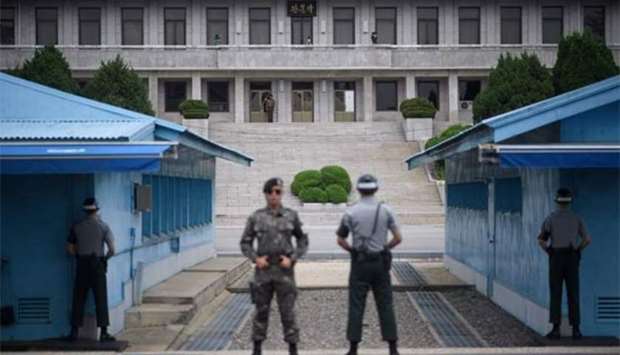South Korea on Monday silenced its battery of giant loudspeakers that blast messages at the North's border soldiers, in a conciliatory gesture before Friday's historic inter-Korean summit.
Despite tentative hopes of a breakthrough over Pyongyang's nuclear arsenal, US President Donald Trump warned that a solution to the North Korean crisis remains a "long way" off, as he prepares for his own planned meeting with Kim Jong Un. Observers are weighing the significance of an array of headline-grabbing offers this year from the North -- including discussions with arch foes Seoul and Washington, and most recently a weekend promise to suspend nuclear and missile tests -- after months of surging tensions.
The South's President Moon Jae-in on Monday hailed Pyongyang's promise to stop major weapons trials as "significant". He is due to meet Kim on Friday in the truce village of Panmunjom at the heavily-fortified frontier.
In preparation for the talks -- only the third of their kind since the end of the 1950-53 Korean War -- the South switched off its propaganda broadcasts, which previously filled the air in the Demilitarised Zone with news, music and exhortations to the North's soldiers to defect.
The North plays propaganda of its own.
"We stopped loudspeaker broadcasts... as of today in order to ease military tension and to create a peaceful climate... ahead of the 2018 inter-Korea summit," Seoul's defence ministry said in a statement.
The two neighbours remain technically at war after the war ended with an armistice instead of a peace treaty, with tens of thousands of soldiers guarding the mine-infested land border.
Relations have improved markedly in recent months, driven by the Winter Olympics in the South, but the question remains whether Kim will promise any concrete steps towards dismantling his nuclear arsenal as demanded by Washington.
The North's leader, believed to be in his mid-30s, has overseen four of the country's six nuclear tests and Pyongyang hails the weapons as a "treasured sword" protecting the country from potential US invasion.
Missile tests
Kim, who has proclaimed the North a fully-fledged nuclear power, has also overseen dozens of missile tests, including intercontinental ballistic missiles (ICBMs) capable of reaching the US mainland.
Analysts are sceptical over his offer to suspend nuclear and long-range missile tests, noting he signalled no intention of actually disarming.
"All of the steps Kim has announced are completely reversible and amount to only words and empty promises -- and North Korea is not exactly known to keep its word," said Harry Kazianis, director of defence studies at the Center for the National Interest, a conservative think tank in Washington.
Kazianis cautioned Kim could quickly ramp up again if he does not get what he wants from the upcoming summits, urging the international community to be "hopeful -- but not stupid".
Kim conducted the North's biggest nuclear test yet last September, the same month he branded "mentally deranged" Trump a "dotard," after the American president called him "Rocket Man" on a "suicide mission."
The rhetoric has softened in recent months, with Trump on Sunday hailing Kim's promise to suspend tests and close its atomic test site as "big progress".
"We haven't given up anything & they have agreed to denuclearisation (so great for World), site closure, & no more testing!" Trump wrote on Twitter, apparently responding to remarks made by an NBC news host.
"We are a long way from conclusion on North Korea, maybe things will work out, and maybe they won't - only time will tell.... But the work I am doing now should have been done a long time ago!"
Moon was upbeat about Kim's latest move, saying on Monday in a meeting with aides that Pyongyang's announcement was "a significant decision towards total denuclearisation of the Korean peninsula" and "raises hopes that the pace will accelerate".
Kim will step into South Korean territory for the first time as leader for Friday's meeting in Panmunjom. Previous meetings between the two Koreas were in Pyongyang, in 2000 and 2007.
But it is not Kim's first foray into international diplomacy.
In March he paid a secretive visit to Chinese President Xi Jinping in Beijing, aimed at shoring up frayed relations with the North's sole ally, which provides an important economic and political buffer against international opprobrium.

